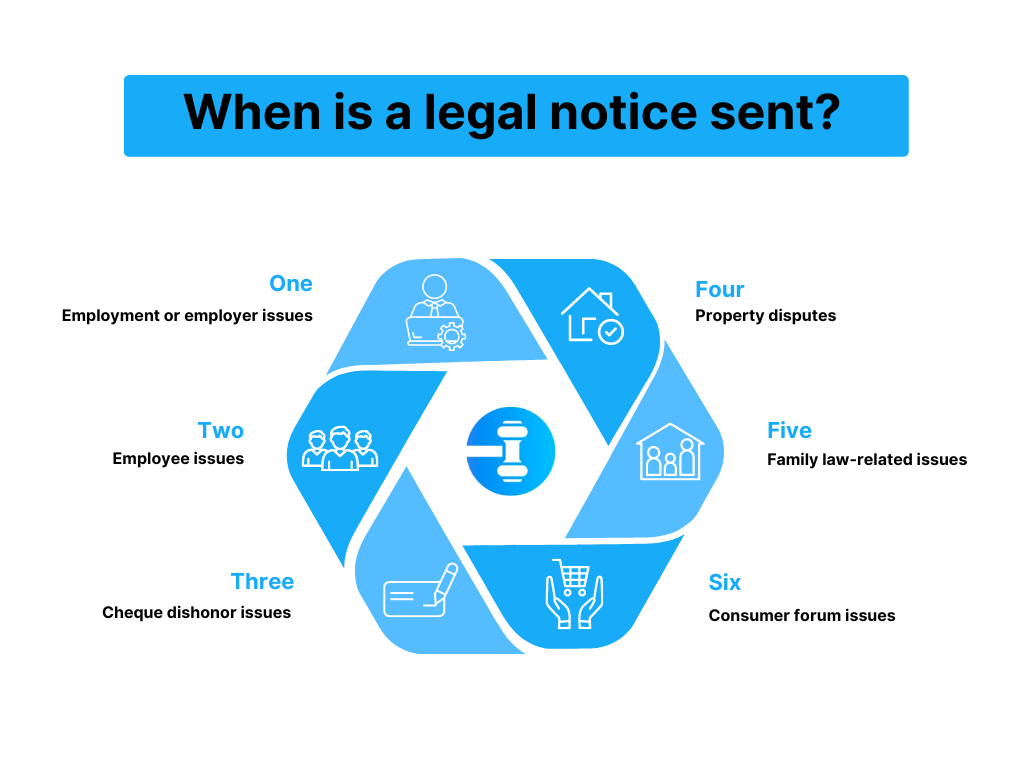A Guide to Legal Notice Drafting
Legal notices are crucial for any legal proceedings to begin. Actually, in a few cases, the lawyer has to ensure there is a formal written communication exchanged between the parties before proceeding with any matter in the Court, making legal notices mandatory pre-requisite. That’s why legal notice drafting is a crucial element of legal work.
It is only through a legal notice that the sender notifies the recipient about his intention of undertaking legal proceedings against the latter. For example, legal notice for recovery of money is a formal intimation between two parties- the lender and the borrower. The notice warns the borrower before initiation of any legal action to get the due payment.
A well-drafted legal notice increases the chances of resolving conflicts out of the Court through dialogue or Online Dispute Resolution methods with consensus from both parties involved.
When to send a legal notice:
- An employer can serve a legal notice to an employee for violating any terms mentioned per the employment contract, sexually harassing a co-employee, violating the HR policies, abruptly walking out of a job without prior notice, etc. Similarly, an employee can draft a legal notice to the employer for unpaid salary, violation of the employment agreement, termination without reasonable cause, etc.
- A lender can send legal notices against the borrower in case of a cheque dishonor issue.
- Legal notices are critical in case of disputes related to property such as ownership disputes, mortgages, eviction of occupants, etc.
- Similarly, a legal notice can be drafted for a family member for personal issues such as divorce, child custody, inheritance disputes, etc.
- Consumers can send notices to manufacturing companies in case of delivery of faulty products or providing faulty services, etc.

Laws that mandate Legal Notice drafting:
Section 138 of the Negotiable Instrument mandates and guides the issuance of legal notice for a borrower within 30 days from the date the cheque has been bounced since the last date of EMI.
Furthermore, if the sender is not paying the amount within 15 days after receiving the legal notice, then the lender can file a suit against him within 30 days from the date the sender received the legal notice.
This section also talks about criminal liability that nonpayment may result in; which mentions the borrower may get two years of jail, a fine, or maybe both.
Moreover, under Section 13(2) of the SARFAESI Act, the Banks. Housing Finance, NBFCs have to send legal notices to the defaulting borrowers.
This is statutory compliance which the lender must meet before proceeding with other business processes like taking symbolic possession of the mortgaged property or auctioning the property to recover the debt amount.
The role of Legal Notices in Debt Resolution:
With the rise of credit cards, easy access to loans, and numerous neo-banking and buy-now-pay-later options, money lending is on the rise. And, one of the crucial steps to recover money in India is to send a legal notice. Generally, an assigned lawyer appointed by the lender takes care of the legal notice drafting to ensure proper formatting and validity if a case goes to Court.
A legal notice draft must contain the following points:
- Name, description, and place of residence of the sender of the notice
- Details of the cause of action
- The monetary relief claimed by the sender of the notice
- The gist of the legal basis for the relief claimed
- Address and contact details of the advocate who drafted the legal notice
The challenge associated with Legal Notices:
The task of drafting and sending legal notices requires a lot of manual effort and is often prone to error as the details provided in the notice have to match the original documents.
Legodesk allows lenders to store and process the personal identity information of the defaulters, like Address, Email & Phone number, etc., to generate legal notices and track them after being dispatched.
It ensures that legal teams meet all the important criteria for matters. Especially, those related to sec 138 NI act and Sec 13 (2) SARFAESI Act.
It becomes complicated when we have multiple lending products to deal with, which differ in their compliances. However, Legodesk allows teams to upload multiple templates to generate notices based on their loan products.
Moreover, the Laws mandate that a Court can take legal action only after the receiver has successfully received/read the notice. In the traditional postal way, losing track of the deliverables is easy.
Another smart and useful feature of Legodesk is the integration with India Speed Post. This ensures that legal teams do not miss out on tracking the delivery of these notices to the defaulters. Moreover, they can access Proof of Delivery receipts forever instead of 60-90 days on the India Speed Posts website.
And, the platform generates MIS reports to analyze the number of notices generated or the statuses of these notices sent via Indian Posts.
Additionally, with ISO 9001 certification, Legodesk ensures end-to-end data encryption, all personally identifiable information is secure, and no third party has access to sensitive financial data.
Legodesk is an intelligent tool for legal teams not just to do legal notice drafting. The tool allows you to automate your end-to-end workflow. Have you tried Legodesk yet? Sign up for free now.
Try our Debt Resolution solutions today Request a Demo
